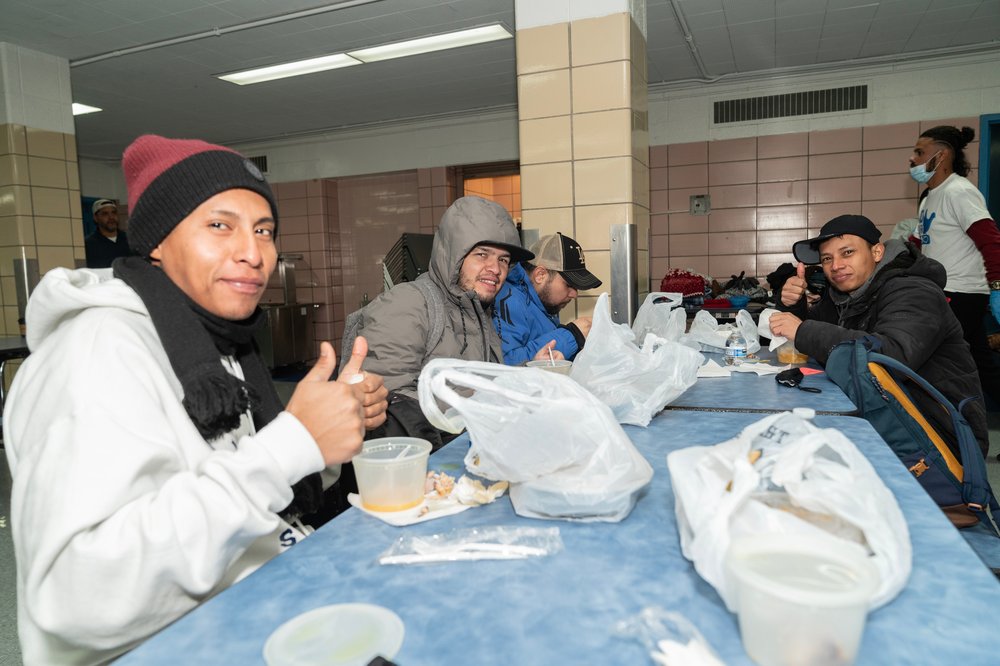NYC comptroller says city’s approach to migrant crisis is financially unsustainable
March 7, 2023, 12:38 p.m.
The city must shift focus to helping asylum-seekers ‘get out of shelter,’ the report says.

New York City's comptroller says the city's current approach to the migrant crisis is financially unsustainable and that officials should shift focus and prioritize securing long-term housing, according to a new report being released on Tuesday.
Gothamist reviewed an advance copy of the report, which is the most comprehensive analysis to date of city contracts and spending to house and care for an influx of asylum-seekers who began arriving a year ago. Nearly 31,000 migrants are staying in city-run facilities.
New York City is on track to spend more than $4 billion in the current fiscal year and the next to address what city officials and immigrant advocates have called "a humanitarian crisis."
The report found that the city has ramped up its shelter system by 75% to meet its legal obligation to provide housing to homeless residents. Most new migrants housed by the city stay in shelters run by the Department of Homeless Services, where, even prior to the current crisis, the average length of stay was longer than 500 days. DHS has opened 92 emergency hotel shelters since April to manage the influx, and other migrants are in seven so-called Humanitarian Emergency Response and Relief Centers managed by the city's public hospital agency, NYC Health + Hospitals.
“Right now, we’re finding the money to contract for that next hotel every time we need more. But we’re not finding the money for the slightly longer term services that help people get out of shelter. And that’s pennywise and pound foolish because over the longer term, we’ll wind up spending a lot more.
Brad Lander, NYC comptroller
The city's preliminary budget for the fiscal year that begins June 1 includes just $1 billion in migrant aid — “assumed” to be fully covered by federal aid — for this fiscal year, according to the report.
"The city must shift its focus to helping those in shelter,” including homeless New Yorkers who aren't migrants, “to get out of shelter,” the report recommends.
“We haven’t yet spent enough time focused on how do we help people get out of those hotels – into jobs, into permanent housing,” Comptroller Brad Lander said in an interview.
“Both individually and collectively, folks have been so focused on meeting those emergency needs that it has been hard to see further downstream,” he later added.
To help new migrants get on their feet and reduce city spending in the long term, the report recommends that the city rapidly scale up immigration and legal services to more quickly secure long-delayed work permits for new migrants, and implement a range of policies to fast-track them into long-term housing.
The report recommends that the city set aside $10 million to support community-based legal organizations to host pro se clinics and conduct outreach to homeless shelters, emergency relief centers and neighborhoods where newly arrived migrants live. It recommends spending another $60 million for general immigration legal services to help newcomers obtain legal status and work permits. Spending on such services – as recommended by the New York Immigration Coalition and other legal services providers like Catholic Charities and Legal Aid Society – will cost the city less in the long term, Lander said.
“Right now, we’re finding the money to contract for that next hotel every time we need more. But we’re not finding the money for the slightly longer-term services that help people get out of shelter,” Lander said. “And that’s pennywise and pound foolish because over the longer term, we’ll wind up spending a lot more.”
In September, the city released a $5 million request for proposals for private contractors to provide legal services to new migrants that was not awarded, since providers felt they wouldn’t have enough time or funding under the request to “increase their capacity to the levels necessary to adequately represent newcomers,” the report said.
To secure long-term housing for new migrants and other shelter residents, the comptroller recommends a range of reforms long sought by housing advocates. That includes expanding eligibility for CityFHEPS, the city’s rent subsidy program for shelter residents, and supporting and “aggressively implementing” a similar statewide program proposed in the Legislature that would provide housing vouchers to homeless people and those at risk of losing housing.
The report recommends the city use its tens of thousands of vacant rent-stabilized units and ramp up enforcement efforts against “source of income” discrimination, when landlords refuse to rent to tenants paying with public assistance.
Lander said the migrant influx shines a light on long-standing issues in the city's shelters.
"This is the push that we need to get serious and act expeditiously in helping them get permanent housing," he said.
The city has 83 known contracts – a total of nearly $700 million to tackle the crisis – about a third of which have been registered, the report says. Of the contracts that the comptroller has received final amounts for, the office estimates nearly 99% are for housing newly arrived migrants and “related services.”
Meanwhile, only 0.5% of the total planned spending, or $11 million, has been allocated for support services like legal aid, workforce development and literacy programs.
Queens hotel will be NYC's 7th humanitarian relief center for asylum-seekers Mayor Adams says city’s landmark right-to-shelter doesn’t apply to NYC asylum-seekers NYC Mayor Eric Adams visits El Paso as migrant crisis strains city's shelters